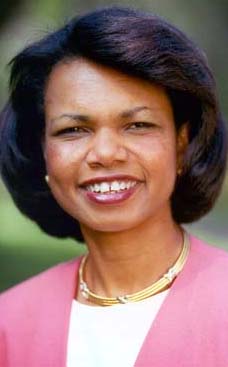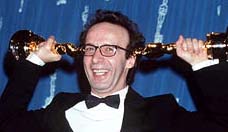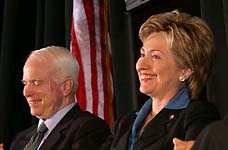
We American s live as bracelets. We are attached to a small circle of acquaintances, friends, and relatives. Beyond our own individual bracelet, we are personally connected to relatively few people in our society, including our neighbors. Ours is a society made up of myriad, twirling bracelets which rarely intertwine.
Africans, in contrast, live as links of a chain. Every single person is consequently linked to every other member of the community by it. From any one link you can arrive along the chain to any other link. To reach anyone along that chain, you need merely hook up with any one of the links. That's why Africans don't need telephone directories, and we can't live without them.
Niger RPCV William F. S. Miles writes: I have been enchanted with the Hausa since living among them and studying their language for two years as a Peace Corps volunteer in the former French colony of Niger
Letter from Ouagadougou
Jan 1, 2006
Antioch Review
[Excerpt]
I have been enchanted with the Hausa since living among them and studying their language for two years as a Peace Corps volunteer in the former French colony of Niger. Most Hausa are Moslem but they are an extroverted people who care more if you speak their language than share their religion. Although concentrated in Britain's former colony in northern Nigeria (where I'd also lived as a Fulbright researcher), they are Africa's wanderers, their zangos, or expatriate communities, ranging from Dakar on the West African coast to Khartoum in the Sudanese eas\t. A few years before I had even found a Hausa-speaking chief presiding over the Africans in Jerusalem's Old City.
While the dominant tribe in Ouagadougou are the Mossi, I hoped that there might also be some Hausa.
Jean-Baptiste indicated, vaguely, that there was a Hausa zango just behind my hotel. But he didn't know too much about it and wasn't enthused about my own plans to venture inside.
As the conference's morning session was closing, an organizer tapped me on the shoulder to inform me that I would be chairing the afternoon session. It was an instruction, not a request. As much as it is an honor to chair a panel, in French academic circles-and particularly Frenchspeaking African ones-it requires considerable academic acrobatics.
In American academia, panel chairing usually consists of lowintensity moderating. You introduce the speakers, their titles, their paper topics, and then set the ground rules for questions from the audience. Between the introduction and Q & A time, you can slip into mental stand-by. Mais pas chez les francophones! Not in Frenchspeaking academies! For the French a panel chair is supposed, above all, to extemporize from the oral presentations a comprehensive summary of what the speakers have just said. Not necessarily to provide a critique, which is the role of the discussant at U.S. universities (and who benefits from a prior reading of the papers).
No, the French chair repeats what has just been said. This is not easy to do, even in your own language. For you have not only the speaker who gauges your attentiveness, but an entire audience that can judge whether you got it right.
After a long afternoon I returned to the hotel mentally fatigued and impatient: fatigued on account of the mental exertions, impatient on account of the conference cocoon. I hadn't come all the way to Ouaga to sit in a bare, dark classroom and listen to dry, academic lectures. It was time to put into practice my African travel philosophy.
We American s live as bracelets. We are attached to a small circle of acquaintances, friends, and relatives. Beyond our own individual bracelet, we are personally connected to relatively few people in our society, including our neighbors. Ours is a society made up of myriad, twirling bracelets which rarely intertwine.
Africans, in contrast, live as links of a chain. Every single person is consequently linked to every other member of the community by it. From any one link you can arrive along the chain to any other link. To reach anyone along that chain, you need merely hook up with any one of the links. That's why Africans don't need telephone directories, and we can't live without them.
Knowing this, stripped of jacket and tie, I proceeded forth into the zango behind the Palm Beach hotel and struck up a conversation with the first person-a tall and burly youth-I encountered. I merely asked him if he could speak Hausa. "No," came the reply in French, "but my friend down the street does." And so I was taken from one link to another. My journey along the Ouagadougou chain had begun.
"Take me to your leader." In American pop lore it is a trite and patronizing clich, but in Africa itself, it remains an appropriate way to proceed. Literally, I said, "I want to go to the House of the Chief of the Hausa."
I didn't ask if there was such a place in Ouaga; I just assumed it.
The response threw me. "Which one do you wish to see?"
Which one? How could there be more than one Hausa chief in Ouagadougou? What was going on among the Hausa in Ouaga, that there should be more than one headman? "Do you wish to go to the chief of the Hausa of Niger, or to the chief of the Hausa of Nigeria?" Here, in Ouagadougou exile, the distinction held.
It was a query that mirrored the thorny question that I had been asked over and over during my one-year sojourn in two Hausa villages on each side of the Niger-Nigeria boundary. "Which village do you like better, ours or theirs?" Diplomacy and anthropological survival prevented me from ever giving a forthright answer to that question. But here, in Ouagadougou, I could no longer evade the choice.
After taking several moments to weigh the import of my admission, I replied, "The House of the Chief of the Hausa of Niger."
It was the wrong answer.














